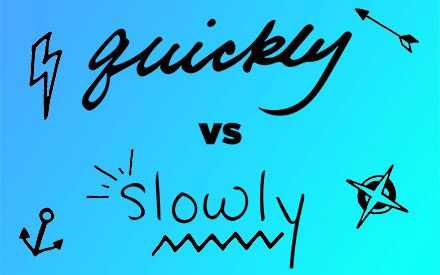Handwriting is quickly becoming a dying art. Few businesses can run nowadays without computers. Most college students type virtually everything, to the point where the phrase “writing a paper” is basically obsolete in the literal sense. Elementary and high schools across the country now view typing courses as essential to their curricula, to say nothing for the fact that cursive writing is all but gone. But what are we losing as handwriting loses its significance in society? Brain power, according to science. Also, its disappearance is not the only way handwriting has changed in the last 100 years.
Researchers from Princeton University and the University of California, Los Angeles conducted a series of studies to demonstrate the differences between students who wrote out their notes and those who typed notes. Participants took notes on a lecture using one of the two methods and were tested on the material 30 minutes after the lecture and again a week later.
The results of the research appeared in Psychological Science, and they were pretty telling. The authors of the study noted that, while past studies on this topic tended to zero in on the distractions that using a computer could present, in this study, participants were using the laptops only to take notes. And hand-writing still emerged as the champ.
That’s not to say that typing doesn’t also have its benefits; there are reasons (besides the ubiquitousness of technology nowadays) that typing has become so widespread. Clearvue Health recently took a deep dive into the findings of the study, going beyond “writing good, typing bad” to assess pros and cons of each.
The typers had a significant edge when it came to note-taking efficiency. The typers could copy down significantly many more words than the writers, sometimes even transcribing the contents of the lecture word-for-word.
But while more of the lecture’s content was retained on paper when typing, it wasn’t necessarily retained in participants’ heads. The tests that the participants took proved this. On the test 30 minutes after the lecture, typers and writers did more or less equally well on questions about the basic facts of the lecture, but typers faltered when it came to more conceptual questions. So while having more precise, detailed notes can help in recalling facts short-term, it takes the focus away from the main points of the lessons. Students who take handwritten notes need to quickly process the lesson and rewrite it in a way they can understand, giving them an advantage in remembering new concepts long-term.
As for the later quiz, well, the results were similar. Students with handwritten notes were able to remember and still understand the concepts of the lecture after a week had passed. These participants were also more open to understanding new ideas. Clearly, writing by hand is one of the little things that can make you smarter.
Computers aren’t going away anytime soon, but that doesn’t mean paper notebooks need to become obsolete. It also might be helpful to look at the typing-vs.-writing debate on a case-by-case basis. If your goal is to be able to spit back facts, the efficiency of typing might best benefit you. But when it comes to truly dissecting information, truly learning from it in the sense of making connections between and analyzing the material, and retaining it in the long run, you can’t beat writing by hand. In addition to handwriting, find out some more things that are vanishing from schools.
The post Why Writing—Not Typing—Will Make You Smarter appeared first on Reader's Digest.










COMMENTS